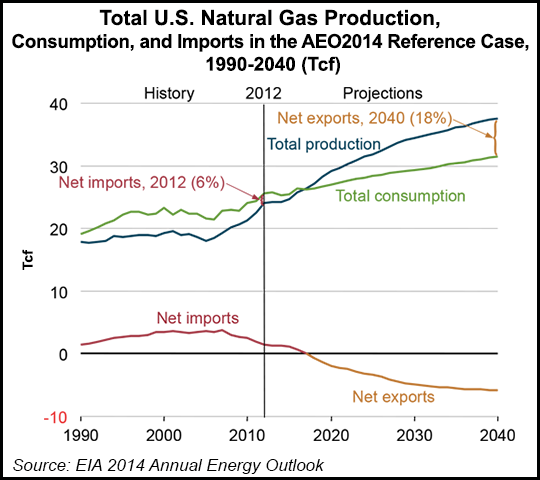NGI Archives | NGI All News Access | NGI The Weekly Gas Market Report
Embrace U.S. Energy Exports, Says Shell CEO
U.S. natural gas and oil exports would reinforce North America’s long-term energy production future, improve the domestic trade balance and stabilize the global energy system, Royal Dutch Shell plc’s chief said Tuesday.

“Policymakers here in the United States should embrace a truly liberalized, diverse and global energy market,” CEO Ben van Beurden told an audience at New York’s Columbia University. He was keynote speaker at a forum at the Center on Global Energy Policy.
Several liquefied natural gas export projects quickly are moving through the regulatory queue. Most U.S. crude exports have been banned since the oil embargo of the 1970s, but the unconventional oil boom has prompted discussions to lift the ban. Meanwhile, the Department of Commerce in March ruled that Pioneer Natural Resources Co. and Enterprise Products Partners LP could export condensate, and more applications are in the offing.
All of those developments are for the good, both for the United States and for the globe, van Beurden told the audience in his first major public speech since taking over Shell in January.
Gradually lifting the ban on oil exports would benefit U.S. consumers because it would allow production to increase and keep it flowing to global refiners. That oil flow in turn likely would keep fuel prices from spiking.
“I don’t think it would be sensible to argue for an immediate opening overnight, but a systematic and gradual opening up of the export ban would be a sensible thing to do,” van Beurden explained.
Global energy demand is rising and will continue to rise, he said. But exploration companies have a duty to do more than produce oil and gas.
“Meeting energy demand is a massive challenge. But so too is the need to tackle the real and growing threat that climate change poses,” said the CEO. “Rising demand for energy and concerns over climate change are clearly the two most powerful influences shaping our energy system.”
Other factors are at work on supply and demand, potentially from oil and gas finds in other global rock formations, geopolitical tensions and the influence of new technologies.
No one fuel would improve the environment or increase the world’s energy efficiency. But natural gas is a good option, said van Beurden. Most of Shell’s global output is weighted to gas.
“Shell has long made the case for natural gas as a versatile, abundant and cleaner-burning fuel,” said van Beurden. “When burned to generate power it produces half the carbon dioxide coal does.” He cited the U.S. Environmental Protection Agency (EPA) mandate to set emission reductions targets at power plants, which should lead a reduction in U.S. power sector greenhouse gas emissions by 15%.
Shell backs EPA’s plans, said van Beurden.
“At Shell we believe that natural gas also has a long-term role as a flexible back-up to intermittent energy sources like solar and wind. A gas-fired plant can start up or stand down much more rapidly than a coal-fired plant.”
Shell also is a supporter of “strong and stable carbon pricing,” he said. “That’s a view Shell shares” with the U.S. federal government, the World Bank and the OECD, or Organization for Economic Cooperation and Development. “A well-implemented carbon pricing system would help to promote low-carbon technologies…and accelerate the shift to cleaner fossil fuels like natural gas. It has the added benefits of being relatively cheap to implement, and of spreading the burden fairly.”
© 2024 Natural Gas Intelligence. All rights reserved.
ISSN © 1532-1231 | ISSN © 2577-9877 | ISSN © 1532-1266 |
